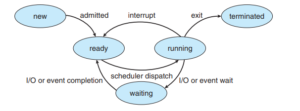Can quantum computing crack the world’s most secure encryption codes, and what does this mean for global security?
A process is like a task that a computer is executing. It may be in different states depending on what it is doing. The following are the main process states: New :Process has just been created. Ready: Process is ready to run but waiting for CPU to get free. Running: Process is being executed by CPURead more
A process is like a task that a computer is executing. It may be in different states depending on what it is doing. The following are the main process states:
New :Process has just been created.

Ready: Process is ready to run but waiting for CPU to get free.
Running: Process is being executed by CPU now.
Waiting: Process waits for some event (for example, waiting for user input or for a file to be read).
Terminated: This means that the process has completed execution and has died.From New to Ready: Here, we have set our process up and it’s ready to execute.
From Ready to Running: While running, the CPU chooses this process of all other processes that are available at that time
From Running to Waiting: In order for the processor or any of its resources not to go idle when running the program, it should pause until an event occurs such as an input clause
From Waiting to Ready: The state which follows after waiting can only happen if some events occur otherwise it will remain constant.
From Running to Terminated: The task has been accomplished by this process
See less

The world's most secure encryption codes, built on the public-key cryptography we rely on daily, are facing a potential earthquake with the development of quantum computers. These machines, harnessing the mind-bending principles of quantum mechanics where particles can exist in multiple states simulRead more
The world’s most secure encryption codes, built on the public-key cryptography we rely on daily, are facing a potential earthquake with the development of quantum computers. These machines, harnessing the mind-bending principles of quantum mechanics where particles can exist in multiple states simultaneously, have the potential to crack current encryption codes exponentially faster than traditional computers.
Imagine the consequences if current encryption crumbles:
Researchers are racing to develop new, quantum-resistant encryption (PQC) to stay ahead of this threat. PQC utilizes different mathematical problems or even quantum mechanics itself for continued data security. The development of both quantum computing and PQC is a race against time. While quantum computers hold immense potential, their ability to break encryption necessitates PQC. By prioritizing secure communication methods and implementing PQC, we can ensure our data remains protected in this evolving technological landscape.
See less